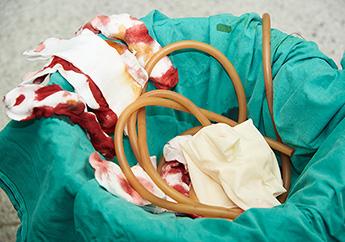
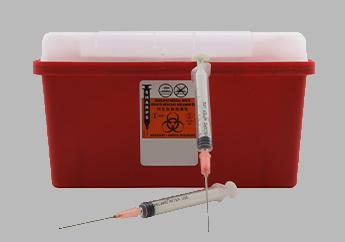

Infectious waste is often called “medical waste” or confused with “healthcare waste". These are general terms that may apply to broader types of waste, with different definitions depending on the state. Infectious waste is actually a much smaller subset of medical or healthcare waste. The Missouri Solid Waste Management rules define infectious waste as a waste that is capable of producing an infectious disease because it contains strong and numerous enough pathogens that someone who comes in contact with it could get an infectious disease from it. Infectious waste is found in healthcare facilities, such as hospitals, doctor’s offices, dental offices, research laboratories and veterinary clinics. Infectious waste is also found in non-medical settings, such as schools, hotels, motels, tattoo shops and manufacturing businesses. It can also be found in our own homes.
If improperly managed, infectious wastes can pose a serious health risk to health care practitioners, hospital patients, waste management employees, the general public and even the environment. In Missouri, infectious waste is regulated from the time it is generated (produced) through treatment and disposal. The regulatory requirements that must be followed for packaging, transporting, tracking or manifesting, treating and disposing of this waste, or exemptions to those requirements, are generally based on who generated the waste and the amount of waste generated. There are three classifications of infectious waste generators: individuals, small-quantity generators (SQGs) and large-quantity generators (LQGs). To determine which infectious waste management requirements apply to you, please review the information provided in the corresponding tabs below. If you have questions about infectious waste, please contact the department's Waste Management Program.
General Information

A Closer Look at Infectious Waste...
Infectious waste is considered a non-hazardous, solid waste and includes the following:
- Communicable waste, which is wastes from patients who have diseases that may be transmitted to others
- Contaminated surgical, dialysis and laboratory wastes generated while a patient has a disease that may be transmitted to others via the wastes
- Discarded cultures and stocks of infectious agents and associated biologicals, including the dishes and devices used during the culturing process
- Tissues, organs, body parts and body fluids removed during surgery or autopsy, including animal carcasses, body parts and bedding from animals contaminated with infectious agents that may be transmitted to humans
- All discarded human blood and blood products, including serum, plasma and other components known or suspected to be contaminated with an infectious agent that may be passed to humans
- Discarded used and unused "sharps" such as hypodermic needles, syringes and scalpel blades - even broken glass or other sharp items that may have come in contact with infectious materials
Who Regulates Infectious Waste?
The statutory and regulatory requirements governing infectious waste management and disposal in Missouri are found in the Missouri Solid Waste Management Law, located in the Missouri Revised Statues, sections 260.203 and 260.204, RSMo and the Missouri Solid Waste Management regulations, located in the Code of State Regulations, 10 CSR 80-7.010 and 10 CSR 80-5.010.
Infectious waste is regulated mainly by two state agencies, the Missouri Department of Health and Senior Services and the Missouri Department of Natural Resources.
- The Missouri Department of Health and Senior Services regulates infectious waste management in hospitals, defines infectious wastes for those entities who generate small quantities of infectious waste and reviews infectious waste treatment methods for approval.
- The Missouri Department of Natural Resources’ Waste Management Program regulates packaging, transporting, tracking, manifesting and disposing of infectious waste and issues permits for facilities to treat or process (consolidate or transfer) infectious waste. In general, once infectious waste leaves the generator, the Missouri Department of Natural Resources regulates the waste.
Packaging
For all those who generate infectious waste while doing business, untreated infectious waste must be properly packaged before being transported to any permitted treatment or disposal facility. Treated infectious waste does not have to meet the packaging requirements described below, except for the packaging requirements for sharps.
- The waste must be placed in rigid or semi-rigid, leak-resistant containers, sealed and clearly marked with the universal biohazard symbol and labeled “Infectious Waste” or “Biohazard Waste”. Red plastic bags are often used for infectious waste packaging, but they cannot be used as the main (or only) container for this waste. All bags of infectious waste must be placed within rigid or semi-rigid containers before transport.
- Sharps must be packaged in rigid, leak-resistant and puncture-resistant containers and sealed before transport.
- All containers must be closed in such a way as to completely contain all waste and the outside of the container must be free of contamination. If containers will be reused to containerize infectious waste, the containers must be cleaned and sanitized in between each use.
Disposal
Untreated infectious waste may not be disposed in any permitted landfill in Missouri, unless the waste was generated by an individual, properly packaged to prevent exposure to anyone who comes in contact with it, picked up by a waste hauler and transported to a sanitary landfill for disposal. All other infectious waste must be treated before disposal at a permitted sanitary landfill in Missouri or transported to a permitted infectious waste treatment or disposal facility.
The specific regulatory requirements that govern packaging, transporting, treating, permitting and disposing are based on the infectious waste generator classification, and discussed in greater detail in the corresponding tabs above.
Individuals
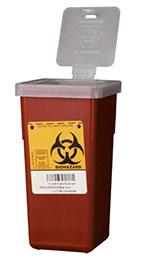
Individuals who generate infectious waste at home are largely exempt from regulatory requirements for treating, transporting, tracking and disposal. However, sharps, such as hypodermic needles, lancets and syringes, must be properly packaged before they are placed with other household trash for collection and disposal, as described below.
Note: The exemption from regulatory requirements granted to an individual does not extend to a business that is hired to clean and sanitize a residence, then remove the treated infectious waste from the home. This cleanup/ sanitation business would be classified as either a small- or large-quantity infectious waste generator, depending on how much infectious waste the business generates in one month. For applicable requirements, please review the information provided in the corresponding tabs above.
Packaging
Individuals must place sharps in a sharps container with a tight-fitting, closeable lid and be leak-proof on the bottom and sides. If sharps containers are not available, another packaging option for individuals only is to use a thick-walled plastic container, such as a laundry detergent bottle. Tape the container shut and place it in the household trash so that the container will not be inadvertently retrieved from the trash to be recycled.

Other infectious waste, such as blood-soaked bandages or packing materials, saturated paper towels, paper wastes contaminated with saliva, phlegm, sputum or other liquid contamination produced by a person with an infectious disease, must be packaged so that anyone touching the waste container will not come in contact with the waste. Place the wastes in any color plastic bag, then tie the bag off as shown in the photo to the right. Packaging infectious waste this way will help prevent diseases from being spread to others.
Disposal
Once the infectious waste is properly package, it should be added to the other routine waste produced daily at a residence, such as from preparing meals, doing the laundry or cleaning the house. The waste is then set out for pick up by the individuals' waste hauler.
SQGs

Small-quantity infectious waste generators are those entities that produce less than or equal to 100 kilograms (approximately 220 pounds) of infectious waste in one month. Examples of small-quantity infectious waste generators are doctor’s offices, dental offices, veterinarians’ offices, tattoo shops, health departments or agencies, schools, motels or hotels, home health agencies, nursing homes and research facilities.
The Missouri Solid Waste Management regulations allow four management options for small-quantity infectious waste generators:
- Mail sharps to a permitted treatment facility using the U.S. Postal Service
- Treat the infectious waste on-site before the waste is transported to a permitted disposal facility
- Transport the infectious waste directly to a permitted facility for treatment
- Hire a licensed infectious waste transporter to pick up and transport the waste to a permitted treatment or disposal facility
For more details about these options, review Infectious Waste Management by Small-Quantity Generators - PUB0188. There are other exemptions to regulatory requirements that may pertain to certain small-quantity infectious waste generators, such as pharmacies and home health agencies. For more information concerning these exemptions, review 10 CSR 80-7.010(1)(C).
LQGs
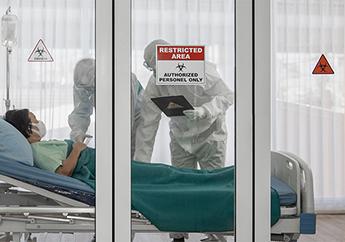
Large-quantity infectious waste generators are those entities that produce more than 100 kilograms (approximately 220 pounds) of infectious waste in one month. These generators are likely large-scale medical facilities, such as hospitals, medical schools, large clinics, laboratories or medical research facilities.
The Missouri Solid Waste Management regulations allow two management options for large-quantity infectious waste generators:
Treat Infectious Waste On-Site
Hospitals and other large-quantity infectious waste generators may treat the infectious waste it generates on-site. Like small-quantity infectious waste generators, large-quantity infectious waste generators may treat waste on-site to render it innocuous (no longer infectious). However, because of the amount of waste produced by these generators, most do not choose this option. The treatment method a generator uses must consistently kill pathogens in the waste, the treatment equipment must be maintained to meet treatment standards and the generator must attest and sign treatment certificates guaranteeing treatment has indeed rendered the waste non-infectious.
If the generator treats the waste on-site, the large-quantity generator must meet all the requirements of the waste treatment certification process, which is described in Code of State Regulations 10 CSR 80-7.010(1)(B). After treatment, any treated sharps must be packaged in rigid, puncture-resistant containers before transporting, and all treated waste must be taken to either a permitted sanitary landfill or other disposal site.
The waste generator may transport the treated waste to a permitted waste disposal facility, using a secure delivery vehicle, or have its regular waste hauler transport the treated waste to the disposal facility. In either case, a treatment certificate, completed by the generator, must accompany the shipment and be provided to the waste hauler (if applicable) and the permitted sanitary landfill for their records.
Before the waste is transported to a permitted disposal facility, the waste generator should make contact with their waste hauler (if applicable) and the permitted sanitary landfill where the waste will be taken for disposal. The generator must determine what, if any, additional actions are needed before giving the treated waste to the hauler (if applicable) or transporting the waste themselves to the landfill. This will ensure the waste will be accepted by both the waste hauler (if applicable) and the landfill. The landfill may consider this waste a “special waste” and require certain forms be completed before accepting the treated waste. This documentation will be in addition to the infectious waste treatment certificate.
Hire a Licensed Infectious Waste Transporter
If a large-quantity infectious waste generator chooses not to treat the infectious waste it generates on-site at the business, the only other option available is to hire a licensed infectious waste transporter to pick up the waste and take it to a permitted infectious waste treatment or disposal facility. Although certain large-quantity generators, such as hospitals, are allowed to transport its infectious waste directly to a permitted infectious waste treatment or disposal facility, it must use its own staff and locked delivery vehicles to do so. Otherwise, hospitals, like other large-quantity generators, must hire a licensed infectious waste transporter.
Infectious waste generators must ensure untreated waste is properly packaged before transporting. Infectious waste transporter companies usually provide waste packaging and tracking documents, or manifests, to waste generators that meet the regulatory requirements. The manifests allow tracking of the waste during transport to a permitted infectious waste treatment or disposal facility. After treatment or disposal, the facility will return a copy of the completed manifest(s) or tracking document(s) to the large-quantity generators to prove the waste was treated and disposed of according to the regulatory requirements. These documents must be kept in the generators’ records to show proof of proper waste disposal.
Transportation
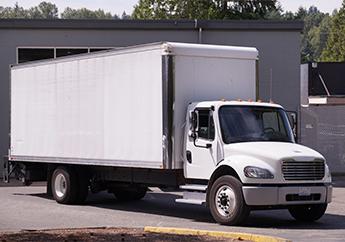
For transportation options for small- or large-quantity infectious waste generators, please review the information provided on the corresponding generator tabs above. The information provided here pertains to large-quantity infectious waste generators that want to transport their own waste to a permitted infectious waste treatment or disposal facility, or other businesses who desire to operate an infectious waste transportation business. For regulatory requirements about infectious waste transportation, review Code of State Regulations 10 CSR 80-7.010(4). Requirements regarding manifesting or tracking documents during waste transport are provided in 10 CSR 80-7.010(3).
In Missouri, large-quantity infectious waste generators that want to transport their own waste and businesses who desire to haul infectious waste for small- and large-quantity infectious waste generators must first obtain a Hazardous Waste Transporter License from the Missouri Department of Transportation (MoDOT). This license allows the transporter to haul infectious waste from the point of generation to the permitted treatment facility. Companies may apply for a Hazardous Waste Transporter License online through MoDOT Carrier Express. The application provides an option to indicate that the transporter license is to haul infectious waste. For more information, visit MoDOT’s Hazardous Waste Transport webpage. You can also reach MoDOT by telephone at 573-751-7100 or toll-free at 866-831-6277.
Once MoDOT issues the license, the Missouri Department of Natural Resources is notified and adds the transporter’s name to the licensed infectious waste transporter list.
Popular Links
Navigation
- Sites and Regulated Facilities
- Investigations and Cleanups
- Long-Term Stewardship (LTS)
- Waste and Recycling Business and Industry
- Reduce, Reuse and Recycle
- Waste and Recycling Data and e-Services
- Waste and Recycling Financial Assistance Opportunities
- What We're Doing - Waste and Recycling
- Get Involved - Waste and Recycling
Contact Information
Waste Management Program
Division of Environmental Quality
P.O. Box 176
Jefferson City, MO 65102-0176
United States
